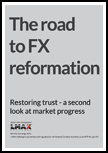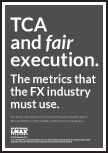Electronic trading has become the main mode of trading in FX and now accounts for more than 60% of all trading done in the global FX market. Moreover, Aite Group expects to see electronic trading adoption to continue in the FX market, reaching 70% by the end of 2013.
This reality does not predict the end of voice trading, however. Typically, voice has a bigger role when large trades are being done. In addition, during times of severe market volatility, it is common for clients to rely on their relationships with banks to get much-needed color into where the market is headed and to get it via voice. This was certainly the case in 2009, when, following the record volume of 2008, the dramatic dislocation of the general global economy created much uncertainty in the marketplace, leading to widened spreads and lower trading volume. During this time, reliance on high-touch, voice-driven trading became crucial for clients seeking to navigate market uncertainty.

Electronic trading is more pronounced than voice in the interbank market, where it currently accounts for an estimated 70% of all interbank trading volume. In the client-to-dealer market, however, voice-driven business, with 51% of the market, still outpaces electronic business.
Source: Aite Group ‘Global FX Market Update 2013: Increased Market Transparency, More Competition’, June 2013
Video Transcript
Adoption of electronic trading
LMAX Exchange CEO, David Mercer, comments on the recent Aite Group report statistic of 60% of current FX volumes are trading electronically which is expected to grow to 70% in the next three years. David Mercer suggests the percentage should be higher to either 95% or 100% in the future as the ways to access the core FX market is increasing in addition to the market becoming more accessible through the use of UI, API, single and multi-dealer platforms. Electronic trading will be the way forward for all asset classes especially FX.





